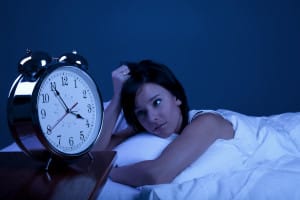New research from a group of American and Australian researchers indicates that people with PTSD have more varied and unpredictable sleeping difficulties than people without PTSD who have diagnosable cases of insomnia. Significantly disrupted sleep is one of the known complications of post-traumatic stress disorder (PTSD). Some affected individuals may have diagnosable cases of insomnia, while others may not. In a study published in February 2015 in the Journal of Traumatic Stress, researchers from several U.S. institutions and one Australian institution compared the sleeping difficulties associated with PTSD to the sleeping difficulties found in people unaffected by PTSD who receive a primary diagnosis of insomnia (formally known as insomnia disorder). These researchers found a much less predictable pattern of sleep disruption in people with PTSD.
PTSD and Sleep Disruption
Difficulty falling asleep, staying asleep for sufficient amounts of time and/or avoiding waking up prematurely toward the end of sleep are classic hallmarks of insomnia, one of the most common forms of sleep disruption. People with post-traumatic stress disorder commonly have unusually high chances of experiencing at least occasional bouts of insomnia. People affected by the disorder also have increased chances of experiencing sleep disruptions associated with nightmares. This fact holds true because one of the core symptoms of PTSD, unwanted reliving of traumatic experiences, often occurs during sleep and produces the seriously or severely uncomfortable emotional states that characterize nightmares. (Another form of unwanted reliving, known as a “flashback,” occurs during conscious hours.) Apart from any nightmare-related issues, some people with post-traumatic stress disorder develop sleeping problems associated with a recurrently negative or worrying frame of mind. Others develop problems associated with an overly activated “fight-or-flight” reaction that makes them unusually jumpy or jittery. The National Center for PTSD reports that excessive alcohol intake, excessive drug intake and persistent pain and other physical issues can also play a role in PTSD-related sleeping difficulties. Any combination of these factors may underlie the problems found in any given person.
Primary Insomnia
Sleep specialists and mental health professionals use the term primary insomnia to refer to serious, dysfunctional cases of insomnia that don’t stem from PTSD or other mental health issues, physical health issues or identifiable environmental factors. Under guidelines established in 2013 by the American Psychiatric Association, the modern term for this condition is insomnia disorder. Unlike the old primary insomnia definition, the new insomnia disorder definition allows doctors to consider cases of insomnia that have their roots in other mental, physical or environmental health issues. Along with conditions such as narcolepsy and hypersomnolence disorder, insomnia disorder belongs to group of diagnosable problems called sleep-wake disorders.
PTSD-Related Problems vs. Primary Insomnia
In the study published in the Journal of Traumatic Stress, researchers from San Diego State University, the University of California at San Diego, the U.S. Department of Veterans Affairs, the National Center for PTSD and Australia’s Monash University used data drawn from 97 adults to compare PTSD-related sleep disturbances to the disturbances found in people with insomnia unrelated to the impact of any known mental, physical or environmental factors. Forty-five of these adults were PTSD-affected veterans of military service in Iraq or Afghanistan. Another 25 participants were unaffected by PTSD and had primary insomnia, while the remaining 27 study participants acted as a generally healthy third comparison group. The members of all three participant groups received testing that objectively and subjectively measured their ability to get restful sleep. Included in this testing were measurements of changes in night-to-night sleeping times for each person, the average amount of restful sleep in each group and the total amount of sleep variation found within each group. The researchers concluded that the study participants with PTSD had unusually inefficient sleep when compared to people with primary insomnia and people unaffected by sleeping problems. They also concluded that, compared to participants with primary insomnia, the participants with PTSD had unusually erratic night-to-night changes in their individual sleeping patterns, as well as unusually erratic night-to-night changes in their overall group sleeping patterns. The study’s authors believe their findings indicate that sleep disruptions in people with PTSD are substantially less consistent or predictable than sleep disruptions in people with primary insomnia. They also believe that awareness of the sleep variability associated with PTSD may help doctors devise personalized approaches to treatment that take individual sleeping patterns into account.

